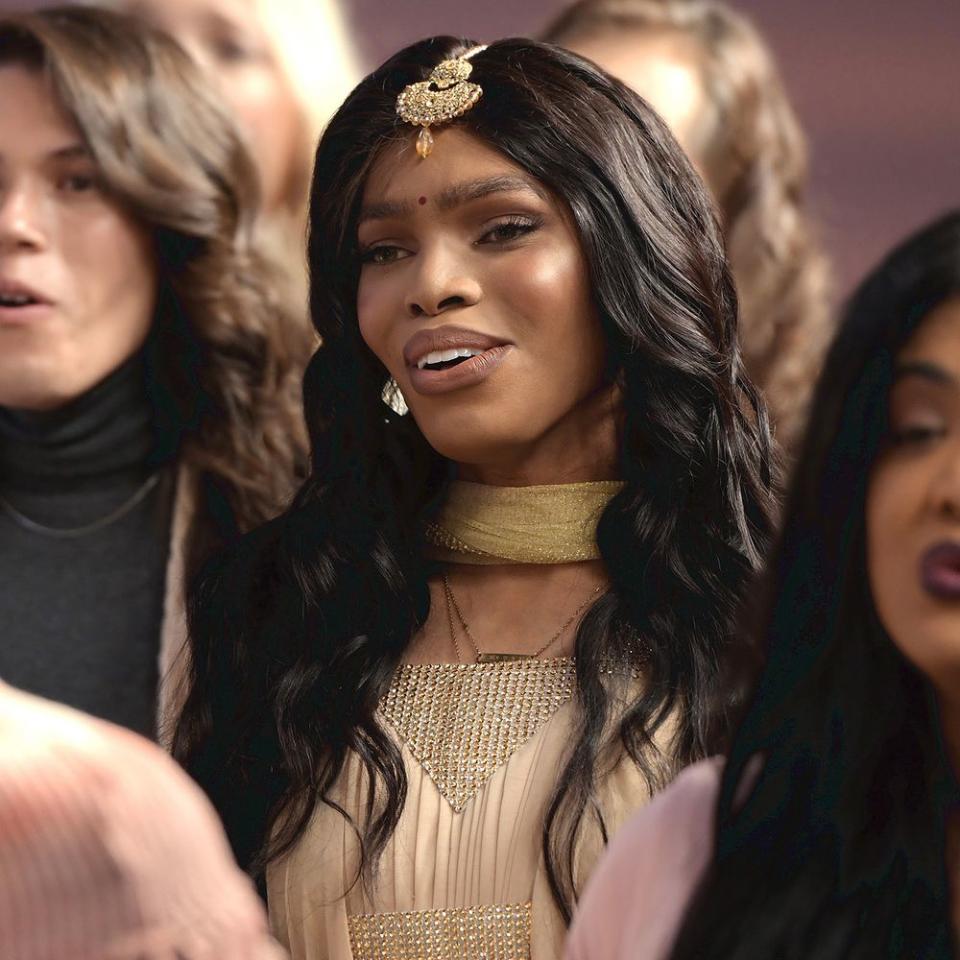Pantene, GLAAD and the Trans Chorus of Los Angeles Partner for an Inclusive New Project
Going home for the holidays is a time, for many in the LGBTQ+ community, of tumult, not comfort.
That’s why this year, Pantene is joining forces with GLAAD and the Trans Chorus of Los Angeles to create a moving rendition of “I’ll Be Home For Christmas” in hopes of bringing awareness to the challenges many LGBTQ+ people face during this family-centric season — and to celebrate individuality.
TCLA is the first all transgender identified choir in America. And this collaboration, “Home for the Holidays”, means a great deal to its 42 members.

“It’s incredible, and really special. I have never seen anything like it,” says 19-year-old Steven Halling (above, center), who’s known in the group as “choir baby” because of his young age.
Halling, who’s studying music in college and aspires to be a conductor, says that even for individuals like him who have accepting parents, he and others in the LGBTQ+ community still “brace themselves” when heading home for the holidays.
In unfamiliar situations, “you have to be ready to correct people, and stand up for yourself,” he explains. But for those who don’t even have the option of going home, the season is especially harrowing.
“That’s why we band together during the holidays and focus on the family we’ve built.”
Halling hopes the video of the group will help both transgender kids who are “figuring themselves out”, as well as their families. “When parents of trans kids come see us somewhere, they come up and say, ‘I know my kid is going to be ok.'”

For chorus member Miliana Singh (above, center), who plans to spend the holidays with her TCLA family, the collaboration “is about visibility and inclusion.”
“We’re normal! We go to the drugstore, we go to the salon. I hope it gets to the point where this is no longer taboo,” says the 30-year-old member, whose family has not been accepting of her journey.
Growing up, she was not allowed to have long hair. But when she moved away from New York to Florida at the age of 17 and decided to transition, she grew it out.
‘I wanted to reclaim my time, take back all those years that I spent struggling,’ she says.
When she returned to the city to visit her family, they called their barber, and shaved her head.
“At that time my relationship with my stepfather was that he would tell me to do something, and I had to do it. I hadn’t found my voice at that point, so I couldn’t advocate for myself. So I just sat in the chair and let [the barber] shave my hair off. My cousin sat across from me and just laughed, saying that I was going to pick my hair up and glue it back on my head. I wished I had the ability to do that, but I didn’t. So I just picked it up, put it in a bag, and I held onto the hair. And then when my stepdad came home, he gave me a pack of cigarettes and was like ‘okay, you made a sacrifice, I’m going to make one too. You can throw away my cigarettes.’ I was mortified that he equated my hair, my femininity, to a pack of cigarettes.”
“That was the start of my hair journey,” says Singh, who eventually stopped going home.
When her grandmother called to ask why she hadn’t been back, I explained, “If I have to go back to being a boy, I don’t want to live anymore.”
“Before, I was alive but I wasn’t living — I felt like a prisoner in my own life. Like everyone was controlling me with strings, and I was just this Marionette doll. I was never a boy, I was never going to be a boy, and I think they knew that, but maybe they thought I would grow out of it or things would change. But I’ve felt like this ever since I can remember,’ she explains. ‘I never envisioned myself growing up to be an adult male. I always envisioned myself as a woman, as a wife, as a mother. So I knew that was the future for me.”
And she was right: today Miliana no longer needs a wig, she has her own mane of glossy jet-black hair, and she smiles when asked about it.
“I like to switch it up, and do colors, go longer, cut, curl, straighten. I’m all about expression!”

Hair is equally significant for Crystal Stull, another chorus member. Growing up transgender in a very religious military family was hard, she says — and hair was always a central part of the argument.
“Since I was 8 years old I’ve been dying my hair, styling my hair, in every way you can possibly think of. I always was focused on my hair, but my family never allowed me to grow it out. I never got it past half the length it is now, they just never allowed me.”
But in 2017 Stull was diagnosed with arthritic autoimmune disease, which requires her to walk with a stick.
“That really pushed me to live my life and my truth. I didn’t want to live a potentially shortened life untruthfully,” she says. “Within a month of being diagnosed I was like ‘I’m done — I need something to ease up, to let go of, to stop causing me so much pain,’ and it was either that, or end everything. So, I ended up deciding: I’m going to live my life as the woman I know I am.”
And with that, Stull grew her hair out. “I started having fun with it again. It’s a really big part of my identity. It means being able to fully embrace my femininity.”
Christmas was hard that year. Her family mis-gendered her and dead-named her. And the years since have only gotten a little easier. So now, she approaches that trip home like “going into battle.”
“Each year, as soon as I bring up being trans or something to do with being transgender, it kind of gets quiet. I push it, though. I feel that although there may be some pushback, it’s important because if I can get them to be fully accepting and fully understanding, then they can influence the people around them, and slowly get everyone understanding that this is not a choice. This is not some fashion statement. This is not something that is wrong in any way. This is my identity. It’s who I am, I didn’t choose it, I was born this way. I fought it for most of my life and I feel like if I can keep advocating for the community and for myself, that even just changing one person creates a chain reaction.”
Today her brunette hair is styled and sits, curled upon her shoulders, for the Pantene shoot.
“I just sent a selfie to my mom and she said, ‘Oh wow, you look really great, you look… pretty,'” she swallows, holding back tears. “That really got to me, because she doesn’t say that. She doesn’t use terminology like that with me, expressing any sort of femininity in any way. So, I’m really hoping that they see the campaign and are proud [of] what we’ve done here, because it’s making a change, and as far as I can tell, and as far as I’m concerned, it’s a very big deal.”

